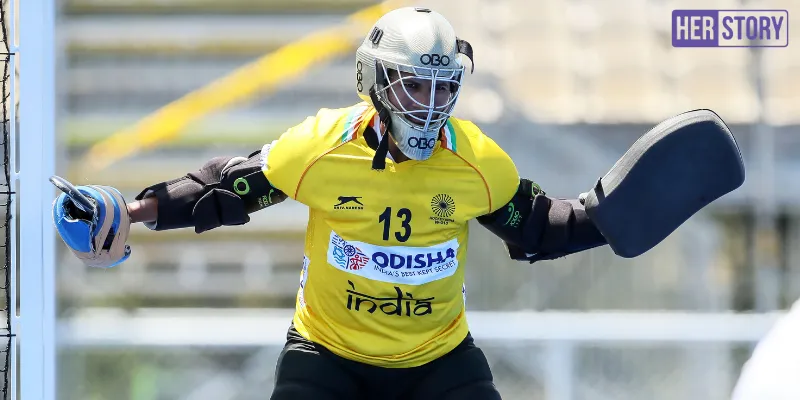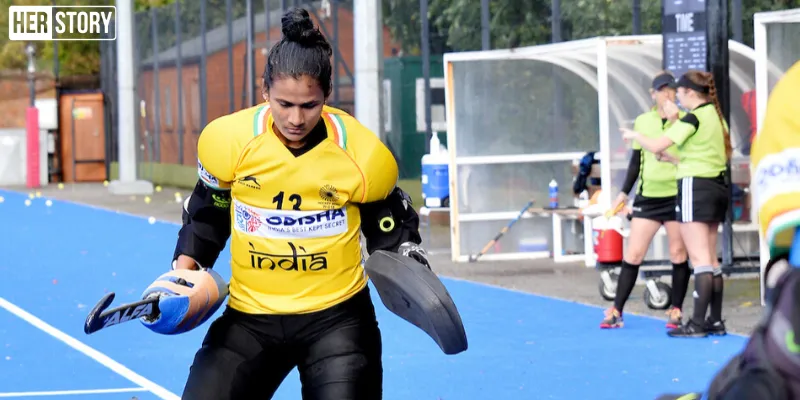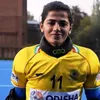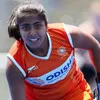A carpenter’s daughter, meet Indian hockey player Rajani Etimarpu who dreams of an Olympic medal
Rajani Etimarpu belongs to a small village Enumulavaripalli in Anantapur district, Andhra Pradesh. Despite being unable to afford proper equipment, her grit and determination led her to play for the national team.
Not many would have heard of Enumulavaripalli village. It is a small hamlet in the Anantapur district of Andhra Pradesh. However, many hockey fanatics know about Rajani Etimarpu, the goalkeeper of the Indian national women’s team who hails from this small village.
Rajani comes from a humble background. She struggled during the initial days in the sport, but her grit and determination serve as an inspiration to many.
She studied at ZPH High School, a government school in Nerabailu. Taking advantage of her tall height, Rajani would often play volleyball during the four or five PT periods a week. Sometimes, her PT teacher would ask her to be the goalkeeper for the hockey team as no one else would come forward to be the goalie.

Rajani Etimarpu's determination and grit is an inspiration to many.
She vividly recalls her farewell function of eight grade in 2004, which led her to start playing hockey. Prasanna Kumar Reddy, the then Secretary of the Andhra Pradesh Hockey Association, spoke at length of the benefits of playing hockey and the Sports Authority of Andhra Pradesh centre in Tirupati where selections were going to be held for new trainees. Her mother was present at the event and later asked her if she was interested.
“I had definitely developed an interest so I decided to go to the Sports Authority of Andhra Pradesh in Tirupati, and luckily, along with two of my friends, I also got selected. It was there that I learnt the most about hockey initially,” Rajani tells HerStory.
She would practice religiously – she would play in the morning, head out to the school, and be back at the grounds again after school as well. She did this for three years before moving to Sports Authority of India (SAI), Hyderabad in 2007. That year, she played the Junior National Championships for Andhra Pradesh and made it to the quarter-finals. Her performance in the tournament propelled her to the Junior India camp in 2008 for the first time.
Call up to the national side
Rajani had been a part of the junior national camp thrice but the opportunity to play for the side never emerged. Sceptical and disheartened, Rajani went on a break to Hyderabad to give her exams, when she received an email about open selections for the Senior India camp in Bengaluru. Determined, Rajani went out to Bengaluru to try out. Her hard work paid off when she was selected for the camp, and later the Indian national team.
In 2009, she played her first international tournament in New Zealand against the hosts.
Recounting the experience, she says, “It was one of the best moments of my life, because before that I never really understood the value of playing for the country, and when I came back from that experience and saw how happy my family was, and my name being in the newspapers – it was amazing and just gave me a newfound belief to keep working hard.”
Since her debut, Rajani, now aged 29, has represented the country in 91 matches and has been part of the team at the Rio Olympics 2016, Commonwealth Games 2010, and FIH Women’s World Cup 2010.
Her struggles

Rajani deep in training before the start of a match.
Though goalkeeping was not her first choice, Rajani continued to take it up seriously when her PT teacher asked her because of her height. Later, it became her choice when she took up playing the sport seriously. Her journey was fraught with the challenges of not having the right equipment.
Her father was a carpenter and her mother, a housewife. It was difficult for them to afford the equipment when she had just started off. She remembers playing her first tour with a very basic kit. Fortunately, some coaches and senior players in the team helped her buy the whole kit. Once she became a regular part of the team, sponsors came in and buying kits became easier, but she remembers that “initially, during the younger days, it was a struggle.”
Through her struggles, she relied on the pillar of support from her family. “My biggest inspiration has been my mother. She has always been there for me, and she has sacrificed a lot for all of us. My father has also been very supportive and I look up to my parents,” she says.
“We are four siblings in total – three girls and a boy – and my parents have helped all of us, each day of our lives, and I can't thank them enough,” Rajani adds.
The Olympics
For Rajani, the Olympic Qualifiers in 2015 count as one of the highs of her over-a-decade long career. The performance in the qualifiers had given Indian women’s team to represent the country at the Olympics after a 36-year wait.
“It was a moment where we all realised how much the sport meant to the nation, and how our performances on the field made our families proud. It was a moment when I realised that everyone in my village, and even in my state, got to know about me, and it earned a huge amount of respect for my parents as well,” says Rajani.
Even though she wasn’t a part of the final 16 at the Rio Olympics, she cherishes the experience and the environment of the Olympic Games Village.
Speaking about the impending Olympic Games in 2021 at Tokyo, she says, “We will be aiming to learn from our experience of Rio in 2016, and will make sure that we perform well. Ten out of the 24 players currently in our Core Probables group had been at the Rio Olympics, so I think we have all gained a lot of experience now, and we can really pose a threat next year.”
The yet elusive Olympic medal, Rajani says, is not only her personal but a collective goal for the team.
“What we (the team) always discuss is to create history, and make sure that we do something extraordinary and leave behind a legacy for years to come. Everyone should remember this team – and that can only happen if we give our best in Tokyo next year,” she adds.
Edited by Kanishk Singh









